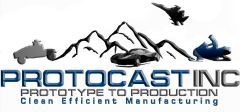Die casting is a metal casting process characterized by forcing molten metal under high pressure into a cavity and is usually performed at a metal foundry. This procedure is useful in the mass production of items that need to be very accurate according to specifications. Die casting is an appealing process for many business owners as it is a cost-effective method for the manufacturing of sturdy items and parts. When selecting the appropriate material for your project, several factors must be taken into consideration.

Die Casting
Prototype Casting Inc
Aluminum is a popular alloy used in die-casting, however, it is prone to shrinking and cracking at high temperatures. To avoid this, it is often alloyed with silicon or copper, creating a combination that increases hardiness and fluidity. And since this combination is also resistant to corrosion, it is ideal for electrical and thermal applications.
Copper-based alloys are also used in die-casting as these types of alloys are durable and resistant to corrosion as well. These types of alloys are often used to create electrical and plumbing materials.
Zinc is an alloy that is easy to cast and can be combined with aluminum to create a high-strength material. Since zinc has a low melting point, it is quite suitable for hot-chamber casting. Zinc is a popular material used to create gears and connectors.
Magnesium is a relatively light alloy that is useful in applications that require thin walls and close precision.
Prototype Castings is a leading foundry and machine shop located in Denver, Colorado. Visit our website for further details.
